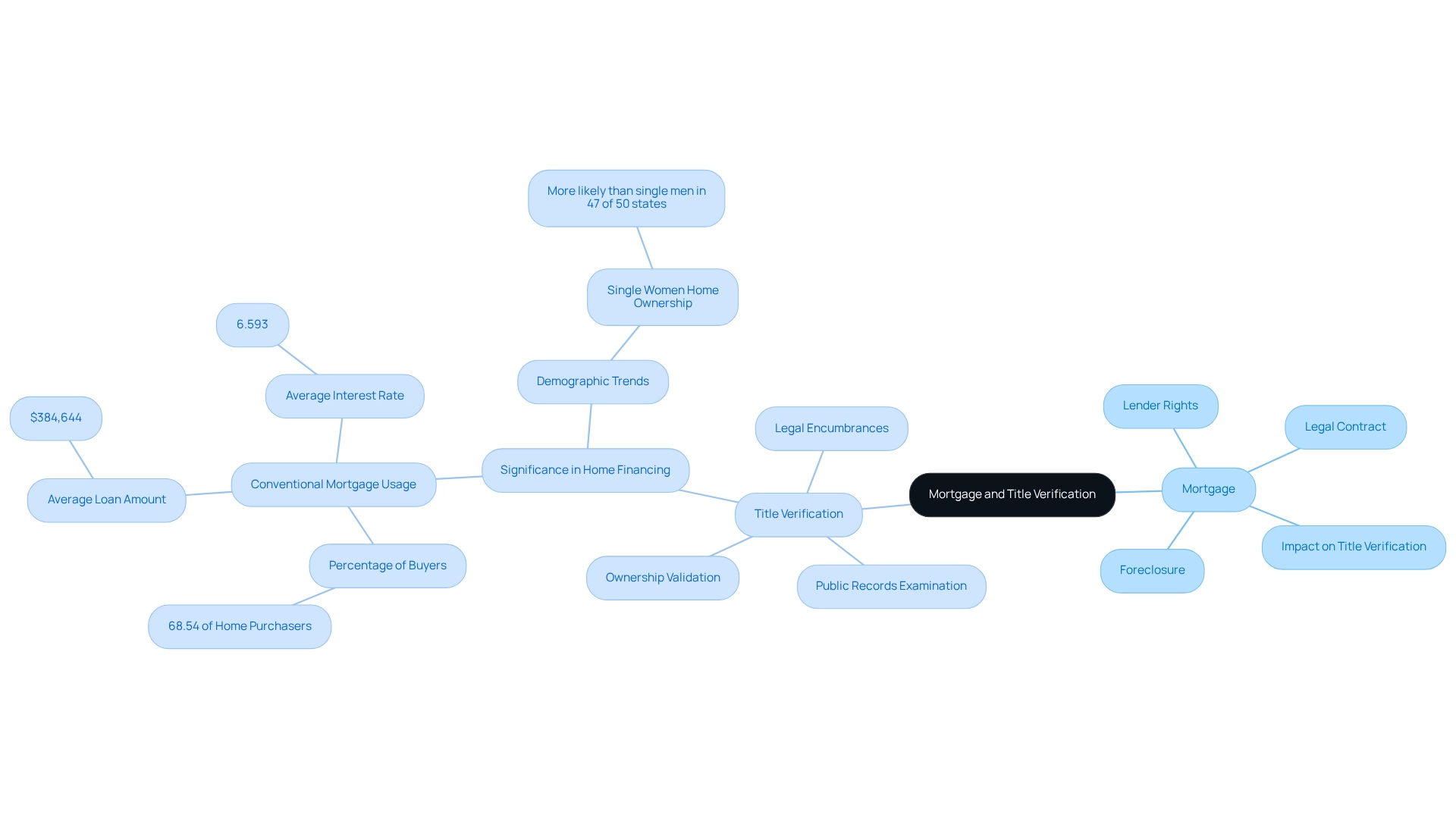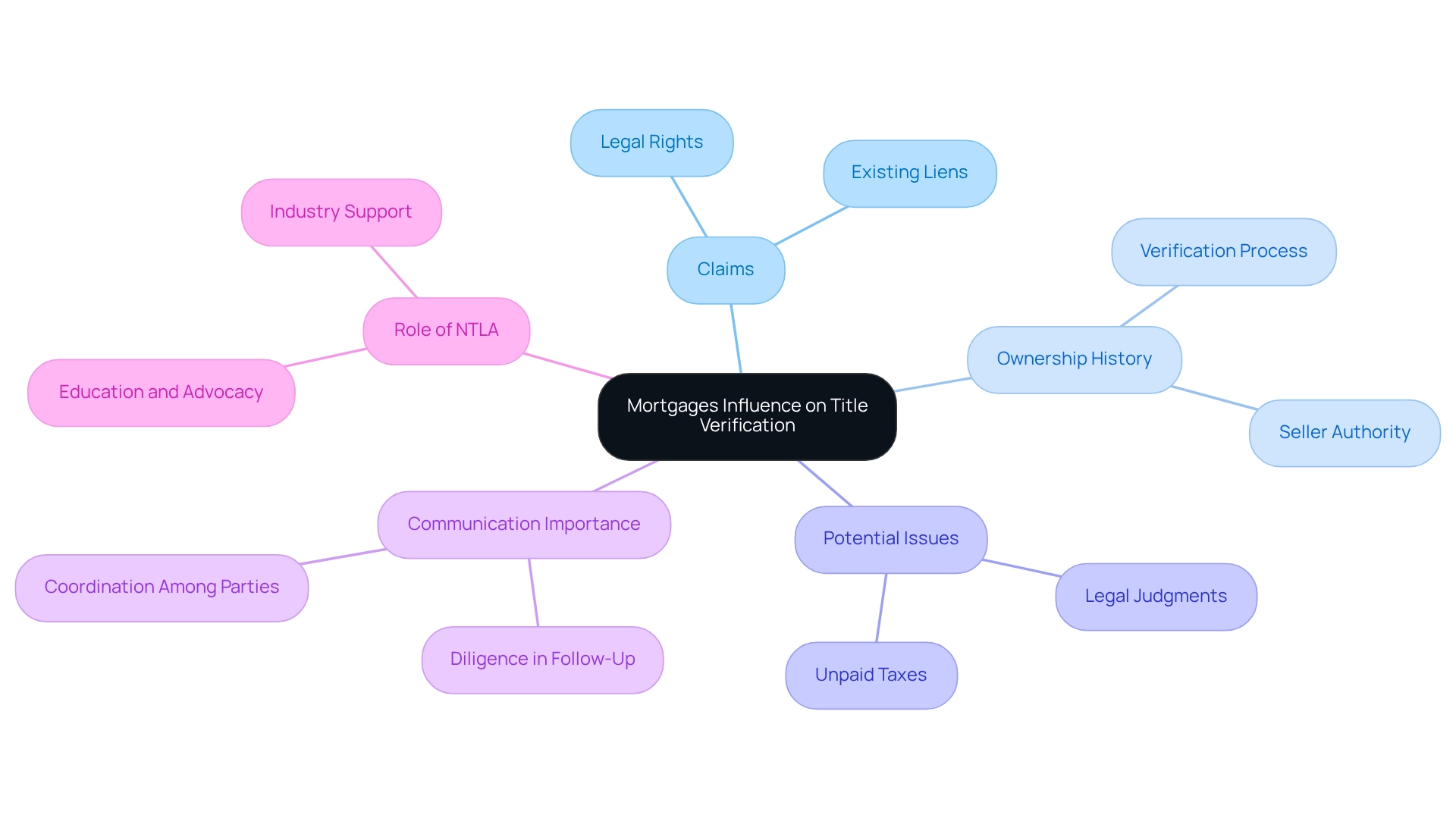Overview
The article addresses the impact of mortgages on the title verification process, emphasizing the necessity of validating legal ownership and existing claims on a property prior to loan approval. It underscores the critical role of thorough property searches, collaboration with title experts, and the need for clear communication to mitigate potential issues that could arise from unpaid claims or discrepancies in ownership records. Furthermore, by ensuring meticulous research and expert involvement, stakeholders can significantly reduce the risk of complications, thereby reinforcing the integrity of property transactions.
Introduction
In the intricate world of real estate, the interplay between mortgages and title verification serves as a critical foundation for successful transactions. Mortgages, which are legal agreements binding borrowers and lenders, establish ownership claims that necessitate a rigorous examination of property titles. Title verification, the process of confirming rightful ownership, ensures that properties are free from legal encumbrances, thereby safeguarding both lenders and buyers alike.
As the landscape of home buying evolves, significant statistics highlight the prevalence of conventional mortgages and the unique ownership trends among diverse demographics. Consequently, understanding the nuances of title verification becomes increasingly essential.
This article delves into the vital relationship between mortgages and title verification, exploring best practices, common challenges, and the technological advancements that streamline this crucial process.
Define Mortgage and Title Verification
A mortgage represents a legal contract between a borrower and a lender, wherein the lender provides funds for the acquisition of real estate, and the borrower grants the lender a claim on the property. This claim empowers the lender to assume ownership of the property through foreclosure should the borrower default on the loan.
Title confirmation is the process of validating the legal ownership of a property. It necessitates a meticulous examination of public records to ensure that the seller possesses the authority to sell the property and that no outstanding claims or liens exist against it. This verification is crucial within the home financing process, as it illustrates how mortgage impacts title verification, ensuring that lenders have assurance that the property is free from legal encumbrances prior to approving a loan.
The significance of ownership verification is underscored by the fact that a substantial proportion of home , with an average loan amount of $384,644 and an average interest rate of 6.593%. Furthermore, the current mortgage landscape indicates that the incidence of delinquencies and foreclosures has not markedly escalated compared to pre-pandemic levels, as noted by Maggie Davis. Ensuring clear ownership of property is a fundamental step in real estate transactions, as it not only protects the lender's investment and safeguards the buyer's rights, but also highlights how mortgage impacts title verification. Moreover, demographic trends reveal that single women living independently are more likely to own homes than single men in 47 of 50 states, highlighting the importance of ownership confirmation in ensuring clear possession across diverse buyer profiles.

Explore How Mortgages Influence Title Verification
Mortgages play a pivotal role in through several key factors:
- Claims: Securing a mortgage establishes a legal right on the property, granting the lender a legal claim until the debt is settled. This necessitates a thorough examination of existing liens during ownership verification to comprehend how mortgage impacts title verification, as any outstanding claims can significantly influence ownership rights.
- Ownership History: Lenders require a comprehensive ownership investigation to verify the property's ownership history. This procedure is crucial to confirm that the seller possesses the legal authority to transfer ownership and that no hidden loans or claims are present that could jeopardize the transaction.
- Potential Issues: Unresolved matters from previous loans, such as unpaid taxes or legal judgments, can complicate the title verification process. Recognizing how mortgage impacts title verification is essential for mitigating risks during mortgage approvals. For instance, a case study on in tax claims illustrates how investors can manage these complexities without direct participation. This underscores the significance of understanding encumbrances in property ownership and their impact on ownership confirmation.
Fred Peet, a Realtor, emphasizes the importance of tracking details and coordinating communication among all parties involved, stating, "A Realtor tracks these details and coordinates communication among all parties, including inspectors, lenders, and attorneys." This highlights the necessity of clear communication in managing claims and ownership history.
Linda Aparo, national director of sales and business development, observes that "These claims were entirely avoidable as long as there was consistent follow-up," further underscoring the essential role of diligence in the document confirmation process.
In summary, the interaction between loans and ownership confirmation demonstrates how mortgage impacts title verification, highlighting the importance of a careful examination of claims and ownership history to protect against potential conflicts and ensure a seamless transaction. The National Tax Lien Association (NTLA), founded in 1997, plays a crucial role in the industry by offering education and advocating for stakeholders, thereby reinforcing the importance of understanding these dynamics in real estate transactions.

Implement Best Practices for Title Verification in Mortgage Contexts
To ensure effective title verification in mortgage contexts, it is imperative to adhere to the following best practices:
- : Always perform a thorough property examination that includes checking public records for any encumbrances or claims against the asset. Given that complex properties with intricate ownership histories can require 10 to 14 days for a property search, a meticulous approach is essential. Ownership insurance, as emphasized in case studies, safeguards purchasers against possible issues like undisclosed ownership claims or liens that might arise post-acquisition, highlighting and offering assurance and financial security.
- Utilize Technology: Leverage advanced technologies such as Parse AI's machine learning tools, including the example manager and research automation, to expedite the search process and enhance precision. These tools efficiently identify discrepancies and streamline data extraction from large document collections, significantly reducing the time needed for verification. In some areas, performing a document search may involve navigating through microfiche images or old ledgers, underscoring the necessity for modern solutions like those offered by Parse AI.
- Collaborate with Title Experts: Engage closely with title firms and legal specialists to ensure that all aspects of ownership are thoroughly examined. Their specialized knowledge can reveal potential problems that might not be readily visible, providing an extra layer of security in the assessment process. As Suzanne Hollander, an attorney and real estate professor, notes, "This person reviews many sources of information related to the property," emphasizing the importance of thorough research.
- Document Everything: Maintain comprehensive records of all discoveries during the assessment process. This documentation is essential for resolving any disputes or claims that may arise in the future, ensuring that all parties have a clear understanding of the ownership's status.
By adopting these best practices and utilizing Parse AI's advanced solutions, including the example manager and research automation, real estate professionals can navigate the complexities of document confirmation while understanding [how mortgage impacts title verification](https://blog.parseai.co/5-tools-for-curing-boundary-discrepancy-titles-effectively) more effectively. Ultimately, this approach safeguards their transactions and enhances client confidence.
Troubleshoot Common Title Verification Issues Linked to Mortgages
Common title verification issues are significant due to how mortgage impacts title verification, which can greatly affect the closing process. Key challenges include:
- Unpaid Claims: Outstanding claims on a property must be resolved prior to closing. Engaging with the lienholder to negotiate payment or settlement options is crucial to avoid delays. Hiring a reputable contractor can significantly lower the likelihood of against a property, as they ensure prompt payments to subcontractors and suppliers.
- Discrepancies in Ownership Records: Ownership records may sometimes reflect inaccuracies due to clerical errors or outdated information. To rectify this, it is essential to cross-reference multiple public records and consult with a title professional to clarify any inconsistencies.
- Fraudulent Claims: Vigilance against fraud is paramount. Signs such as forged signatures or unauthorized transfers should be closely monitored. Implementing strict validation processes and leveraging technology can assist in early detection of these issues.
- Complex Legal Language: Title documents often contain intricate legal terminology that can be perplexing. Employing a legal specialist to clarify these documents guarantees that all terms are clearly comprehended before moving forward with the loan.
Addressing these common issues not only streamlines the title verification process but also illustrates how mortgage impacts title verification, thereby enhancing the overall efficiency of real estate transactions. As of Q4 2023, the prevalence of unpaid liens in real estate transactions remains a concern, significantly affecting loan processes. Notably, buy-to-let agreements accounted for only 7% of all UK lending during this period, emphasizing the competitive environment. Furthermore, Laura Hamilton, a mortgage expert, notes that "the amount of money secured on dwellings in the UK has slowly increased over time," indicating a growing financial burden on homeowners. Understanding these challenges and employing effective strategies can lead to smoother closings and improved outcomes for all parties involved. Additionally, for those dealing with title verification in Texas, understanding lien laws is essential for navigating the specific procedures involved.
Conclusion
The relationship between mortgages and title verification is fundamental to the real estate transaction process, ensuring that both lenders and buyers can engage in transactions with confidence. Defining mortgages alongside the critical role of title verification underscores the necessity of a thorough examination of property titles to prevent legal complications. Furthermore, statistics surrounding mortgage use and ownership trends among diverse demographics highlight the urgent need for meticulous title verification practices.
Addressing how mortgages influence title verification reveals the importance of understanding liens, ownership history, and potential issues that can arise during the process. By adhering to best practices—such as conducting comprehensive title searches, utilizing advanced technology, collaborating with professionals, and maintaining detailed documentation—real estate professionals can navigate these complexities more effectively.
Moreover, troubleshooting common title verification issues, such as unpaid liens and discrepancies in ownership records, is crucial for ensuring a smooth closing process. As the real estate landscape continues to evolve, recognizing these challenges and employing effective strategies will lead to better outcomes for all parties involved. Ultimately, a strong grasp of the interplay between mortgages and title verification is vital for fostering trust and safeguarding investments in real estate transactions.
Frequently Asked Questions
What is a mortgage?
A mortgage is a legal contract between a borrower and a lender, where the lender provides funds to acquire real estate, and the borrower grants the lender a claim on the property.
What happens if a borrower defaults on a mortgage?
If a borrower defaults on the loan, the lender has the right to assume ownership of the property through a process called foreclosure.
What is title confirmation?
Title confirmation is the process of validating the legal ownership of a property, which involves a thorough examination of public records to ensure the seller has the authority to sell and that there are no outstanding claims or liens against the property.
Why is title verification important in the home financing process?
Title verification is crucial because it assures lenders that the property is free from legal encumbrances before approving a loan, thereby protecting their investment and the buyer's rights.
What percentage of home purchasers use traditional loans?
Approximately 68.54% of home purchasers utilize traditional loans.
What is the average loan amount and interest rate for traditional loans?
The average loan amount for traditional loans is $384,644, with an average interest rate of 6.593%.
How has the incidence of delinquencies and foreclosures changed since the pandemic?
The incidence of delinquencies and foreclosures has not significantly increased compared to pre-pandemic levels.
What demographic trend is noted regarding homeownership among single individuals?
Demographic trends indicate that single women living independently are more likely to own homes than single men in 47 out of 50 states.
Why is ownership verification a fundamental step in real estate transactions?
Ownership verification is fundamental because it protects the lender's investment, safeguards the buyer's rights, and ensures clear possession of the property across diverse buyer profiles.




